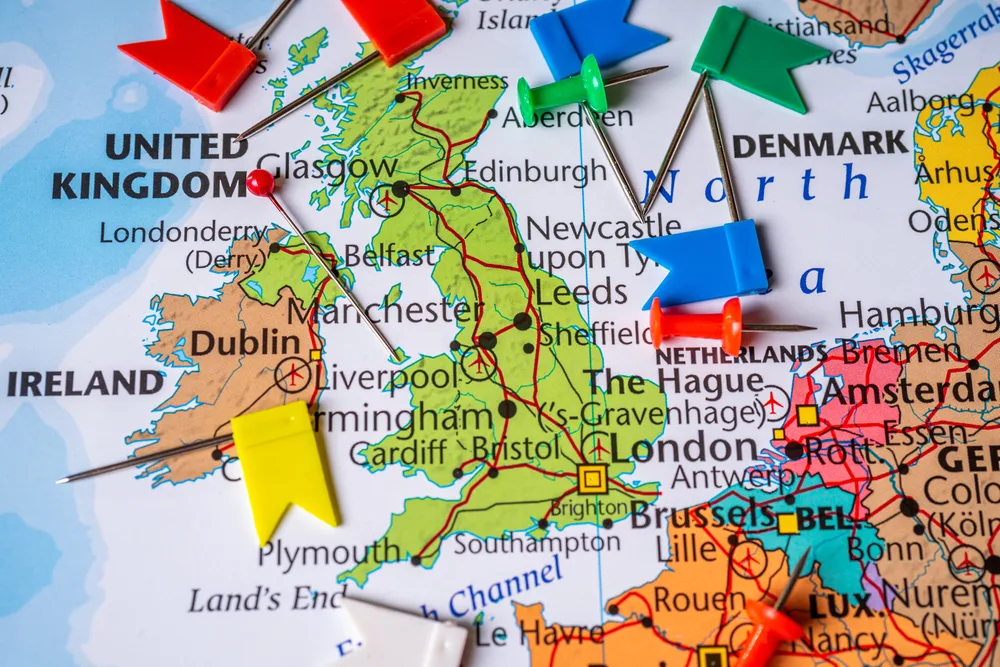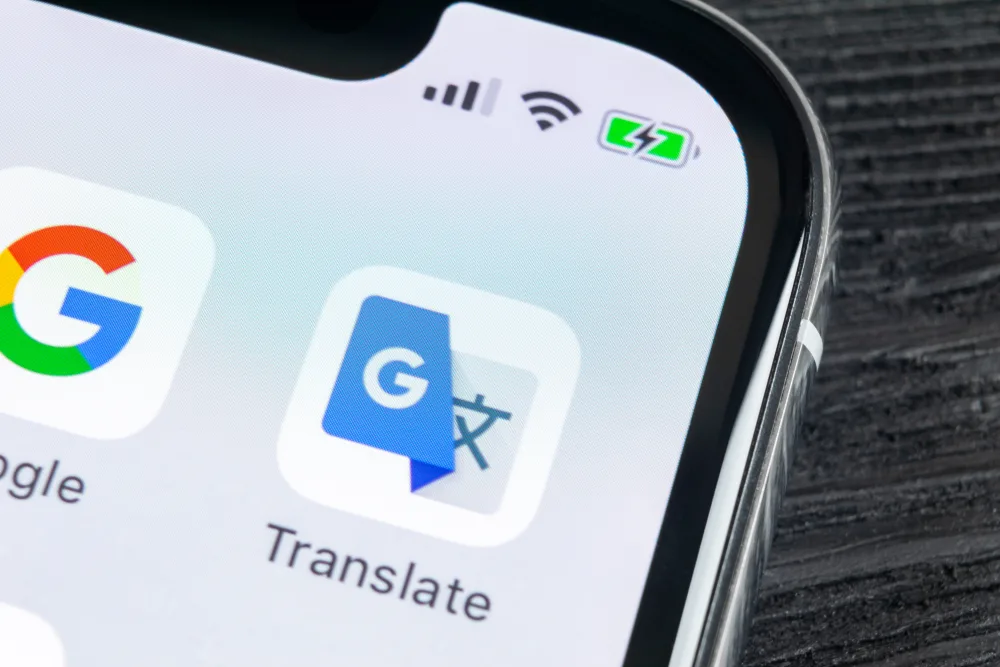Whether you’re traveling to Europe for the first time or the hundredth time, are studying in a foreign country, or are moving abroad for work or pleasure, you’re no doubt curious about how you’ll get by language-wise.
Although much of the world speaks English, not everyone does, and it pays to know where you can expect to be understood – and where you’ll have to work at it.
In today’s post, let’s take a look at which countries in Europe speak English, how English proficiency breaks down across the continent, and what to do in places where you’re among the linguistic minority.
That way, you can travel in comfort, study in style, and work confidently in your new home.
English as an Official Language

Alexander Lukatskiy/Shutterstock
Despite the prevalence of English, a surprisingly small number of countries or nation-states have made it their official language.
These include:
- Cyprus
- Gibraltar
- Ireland
- The UK
- Malta
English and the European Union
English is also an official language of the European Union. This political entity – larger than its nation members but smaller than the Continent it represents, only including about half of the countries in Europe – includes the official language of any of its members as an official EU language.
As such, English was added in deference to the United Kingdom back in 1973, and English remains even though the UK has since left the EU.
It would take an act of law to remove it from the current list of official languages, so for the time being, any official documentation is still translated into English as well as all the others.
European Countries With the Most English Speakers
While English isn’t the official language of many European countries, all of them have at least a percentage of English speakers. And in most places, that percentage is quite high.
According to Statista’s report on the “Share of population with knowledge of English in non-native European countries as of March 2019,” this ranges from Sweden with 71% at the top to Azerbaijan with 46% at the bottom.
Sweden is followed at the top by the Netherlands (70%), Norway (68%), Denmark (67%), Luxembourg (66%), and Finland (66%). Azerbaijan is preceded at the bottom by Turkey (47%), Albania (51%), Georgia (52%), Ukraine (53%), and Russia (53%).
To be fair, the confusion about which countries are included in Europe somewhat muddies the waters.
If you include Iceland, which most people do but Statista did not, then it would be right at the top of the list. While English is not an official language, about 98% of its inhabitants speak it.
This is due to the prevalence of English-language media, the high level of education in the country, and the common ancestry of the two Germanic languages, English and Icelandic.
English: Using the Lingua Franca

Ground Picture/Shutterstock
Whatever the statistics might show, most people in capital cities and other major urban areas in Europe speak English at some level of proficiency.
If you’re concerned about getting around in Europe and want to stay in areas with a high number of English speakers, then you can take the following steps:
- Do your research: If you’re curious about traveling to or living in an area and want to know what the English-speaking prevalence is there, simply Google it. I know, I know … groundbreaking. But seriously, you’ll be able to get most of the answers you need by doing this.
- Call cabs instead of hailing them: When you hail a taxi on the street, it’s going to be cheaper than if you call a company. However, if you call a company, you can request an English-speaking driver.
- Stick to the cities and tourist areas: These almost always have a denser population of English speakers than the surrounding countryside, where native languages are more common in villages and hamlets.
Still, IMHO, it’s pretty easy to get around if you have the money to pay for transportation, because the locals are motivated. And there are only a few times it really matters.
Why Does English Speaking Matter?
Travelers who do not speak another language, or who are traveling for the first time, might feel intimidated by countries with a low percentage of English speakers. And sometimes, even when you’re a hardened traveler, a lack of common language can make life more confusing.
However, there are only a few times when speaking the same language truly matters:
- When you’ve booked a tour: It’s a real bummer to pay for a tour, many of which average around $100 or more, then realize you won’t get much out of the experience due to a language barrier. If you ever book a tour on a website that isn’t predominantly English, make sure to call and inquire.
- If you’re catching an international flight: If you aren’t certain about your communication with a cabbie when you’re trying to get to the airport for a flight you can’t miss, ask to get out. Then grab another cab, take an Uber or Lyft (if that exists in the country you’re traveling in), or take public transportation where you can follow a map.
- When you’re making an expensive purchase: Before you purchase that Swarovski tiara, make sure you’re on the same page. You want to know the price beforehand, not find out from your credit card statement when you’re back home.
Overall, though, you can travel pretty comfortably in places where very little English is spoken. But it’s good to have a plan when you do.
When They Don’t Speak English

Sankt-Petersburg, Russia, April 27, 2018: Google Translate application icon on Apple iPhone X screen close-up. Google Translate icon. Google Translate application. Social media network/BigTunaOnline/Shutterstock
Plenty of people in Europe speak English… and plenty don’t. If you’re going somewhere English isn’t common – for instance, rural areas or parts of Southeastern Turkey, which is in Asia – then it’s good to have a plan.
And by “a plan,” I mean a translation app. The best apps are comprehensive, with good fidelity, and work offline. Google Translate and the Apple Translate app are both good free options.
iTranslate is a great app if you’re willing to pay, because it allows you to translate up to four languages at a time offline, which is impressive.
Navar Papago is the gold standard for Asian languages, because it gets the context right where so many Western-developed apps do not. However, it isn’t very applicable in Europe.
In a nutshell, just make sure your translator app is downloaded, works offline (you’ll want to test it before you head way out into the European countryside), and translates with reasonable fidelity.
Also make sure your phone is charged, because, well… you get it. If you’re going to be away from civilization for a while, bring a solar charger or power bank.
Other Ways to Communicate
If you’re stuck for a common language and your translation app isn’t working for some reason, here are a few more ways you can communicate:
- Show someone the card from your hotel
- Show them a picture of the restaurant or park you’re trying to get to
- Memorize the name of your next destination before you head out, ideally with the appropriate accent in the local language
- Write down or learn the basic words for airport, restroom, restaurant, taxi, and so on
Don’t Forget to Have Fun!

Antonio Guillem/Shutterstock
The great thing about language is that, while we might use different words and grammar in our daily lives, all humans communicate in essentially similar ways.
Indeed, “most experts agree that 70 to 93 percent of all communication is nonverbal,” according to research. Some studies have found that “the interpretation of a message is 7 percent verbal, 38 percent vocal and 55 percent visual.”
Or, in other words (no pun intended), 93 percent nonverbal. The point? If you give it a whirl, you’ll likely be able to communicate your needs with a few minutes of friendly gesturing.
This is one of the reasons travel is so wonderful… it stretches your horizons. So instead of getting frustrated, just enjoy the journey wherever it may take you!



